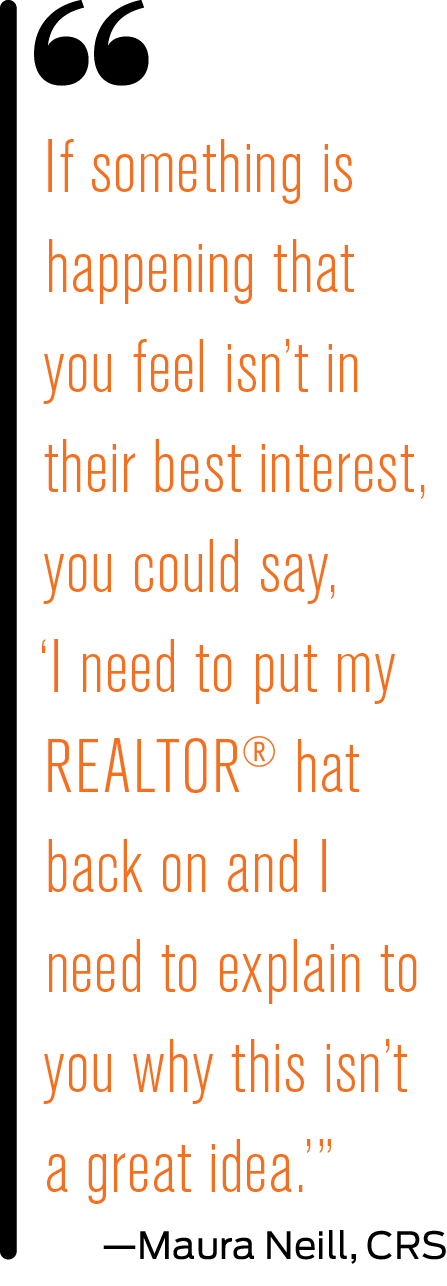Learn how to establish and maintain professional boundaries when dealing clients who want to be friends
By Lisa A. Beach
When a former college lab partner asked Raven Reed to represent him in some real estate-based transactions, she was thrilled.
Reed, CRS, real estate agent with Key Realty LTD in Maumee, Ohio, enjoys helping friends and acquaintances and serving as their trusted advisor. But Reed soon sensed her new client was starting to test the boundaries of their professional relationship.
“He asked, ‘What’s a great restaurant in the area where I could get lunch? Would you mind joining me?’” Reed recalls. He was seeing her as more than a real estate agent and trying to open up that window of opportunity to get friendlier.
Reed’s solution to this tricky situation? She immediately changed the way she communicated with him. “Instead of carrying on any type of friendly tone, I made it strictly business,” explains Reed. “My answers were very thorough and fact-oriented—nothing more, nothing less. I needed to bring him back on task and make him realize I’m representing him as a professional.”
Reed also established professional boundaries. “I just shut it down up front, telling him, ‘I’m very busy. I apologize. Here are some great restaurants. Please enjoy,’” she says. She gave him some recommendations but never took him up on those invitations. “It’s all about establishing that professional boundary.”
While it’s important to create friendly relationships with clients, moving toward “the friend zone” could spell trouble—especially during a transaction. Clients hire you for your market expertise, your negotiation skills and your professionalism—not your friendship.
How client friendships can affect transactions
Emotions can affect judgment
“Once you get emotions involved, it’s a downward spiral for everyone,” warns Retta Treanor, CRS, a broker/owner with Big Valley Properties Real Estate Sales in Hayfork, California. “Our jobs are stressful enough. If you add emotional attachment to the transaction, you’ll elevate the stress to a level where you won’t be as competent as you would be if you kept it just business,” Treanor says.
The possibility of losing objectivity is very real. “It’s not about you, it’s about the transaction—that’s the center of your focus while maintaining that professional working relationship,” notes Diana Galavis, CRS, a broker-associate at Watson Realty Corporation in Jacksonville, Florida.
Reed echoes that sentiment, saying, “The moment you allow yourself to get emotionally involved, you put yourself and your clients at risk of not being able to represent them to the best of your ability. If you feel like those lines are starting to blur, then you’ve got to take a step back and reel yourself in.”
Clients might ask for favors
“The more clients view you as a friend, the more likely they are to ask for a favor, cut your commission and bend the rules,” explains Maura Neill, CRS, real estate agent at RE/MAX Around Atlanta in Alpharetta, Georgia. “That’s where the danger lies.”
You could lose clients’ trust
If clients no longer trust you, you could lose them, says Galavis. “If they somehow view you in a different light than in a professional setting, you’re putting that in jeopardy,” she says.
It could damage the transaction or the relationship
Being friends with your clients can make the transaction feel tense and uncomfortable, especially if things don’t work out. “The client could use the friendship against you and say, ‘How could you let this happen? I thought we were friends,’” Treanor says. “If the transaction goes bad, they won’t forgive you because they’ve put you in a place of some sacred friend that would never let them down—even if you have no control of the outcome of the transaction.”
You could tarnish your reputation
You work hard to build your reputation, but it could quickly disappear if clients see you as a friend. Neill warns, “If you go too far into the personal, you run the risk of no longer being thought of as their go-to professional for real estate questions and advice.”
How to keep relationships professional
Set and reinforce boundaries
From the start of your relationship with clients, you should establish clear boundaries. “Make sure you’re upfront in the beginning of your working relationship about how the transaction will be handled and what your role is as a real estate professional,” advises Galavis. “Clearly outlining the expectations on both sides helps mitigate any friend/professional relationship issues.”
Reed agrees, pointing out how real estate is one of the most emotional transactions. “As agents, it’s our duty to take the emotion out of it and keep our clients in alignment with the idea that this is ultimately a business transaction,” she says, noting the importance of establishing this from the beginning. “Can you have a great relationship? Absolutely. You need to; this is a relationship-based business. But you have to treat it as just that—it’s still business.”
Tread lightly with social get-togethers
It’s not uncommon for real estate agents to receive client invitations to grab lunch, coffee or even drinks.
Some agents think it’s fine to accept these invitations, while others don’t. Either way, it’s best handled by communicating in a professional tone. “It’s easier when you can subtly rebuff invitations, especially if you’re not comfortable hanging out with clients,” says Neill. There are lots of polite, subtle ways to say, “Thank you, but no thank you.” Neill acknowledges that you need to keep the rapport and the friendliness but not cross over into the friend zone. It’s a matter of doing what feels comfortable and authentic for you as an agent.
 Reed draws a clear line in the sand. “I’m a little unorthodox in that I don’t really ever open that floodgate,” she says, noting she meets in a professional setting to draft contracts or discuss real estate issues. “If I do have to meet clients in a public setting, I try to keep it to coffee—quick, informal, having an open conversation in a comfortable environment. Not lunch, not dinner and certainly not drinks. I think that’s where you start to cross into a friend zone.” And if a client wasn’t getting the message after dropping a few subtle hints, Reed advises that full transparency and disclosure is always best.
Reed draws a clear line in the sand. “I’m a little unorthodox in that I don’t really ever open that floodgate,” she says, noting she meets in a professional setting to draft contracts or discuss real estate issues. “If I do have to meet clients in a public setting, I try to keep it to coffee—quick, informal, having an open conversation in a comfortable environment. Not lunch, not dinner and certainly not drinks. I think that’s where you start to cross into a friend zone.” And if a client wasn’t getting the message after dropping a few subtle hints, Reed advises that full transparency and disclosure is always best.
Prepare for that awkward conversation to reel it in
Knowing the potential pitfalls of trending toward the friend zone, real estate agents need to prepare. “We really have to be ready for the conversation that this is business,” Treanor emphasizes. “I’ve had to set clear boundaries with clients that business is business, even asking them, ‘Would you rather have me be a trusted advisor or a friend? We can’t have it both ways. Let me know how you would like to proceed.’”
Neill says if you’re comfortable and confident in your professional abilities, experience and knowledge, you can tell clients you need to have a frank, professional conversation about this. “Remind them that your job is to represent them,” she explains. “If something is happening that you feel isn’t in their best interest, you could say, ‘I need to put my REALTOR® hat back on, and I need to explain to you why this isn’t a great idea.’” She says you must have the confidence to say, “I can’t be your friend in this moment, and I really need to shoot straight.” If you explain it that way, most consumers are going to appreciate that you’re looking out for them, Neill says.
Should You Be Friends After the Transaction?
Once the transaction concludes, your relationship might evolve into a friendship. “I think that’s probably the comfort level for most people because after the transaction, your responsibilities are mostly over,” says Maura Neill, CRS, real estate agent at RE/MAX Around Atlanta in Alpharetta, Georgia. “Find what works for your personality to be able to keep in touch, stay top of mind and get future business without becoming intrusive in clients’ lives if they choose to keep it purely professional.”
Raven Reed, CRS, real estate agent at Key Realty LTD in Maumee, Ohio, says that a friendship might develop genuinely over time. But in general, she says, “My clients are my clients. I love them and care for them, but they are my clients, not my friends.”
Retta Treanor, CRS, broker/owner at Big Valley Properties Real Estate Sales in Hayfork, California, advises staying true to yourself and being the kind, considerate, trustworthy person you are. “You can be all of these things without being your client’s friend,” she says.
Aside from friendships, you can still be influential and build relationships. Watch the recording “Create and Cultivate an Impactful Personal Sphere,” hosted by Leigh Brown, CRS, at CRS.com/webinars.
Photo: iStock.com/Inside Creative House/RLT_Images/bsd555








